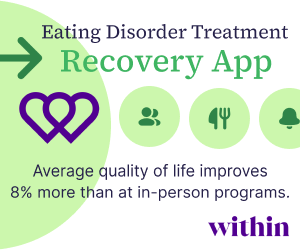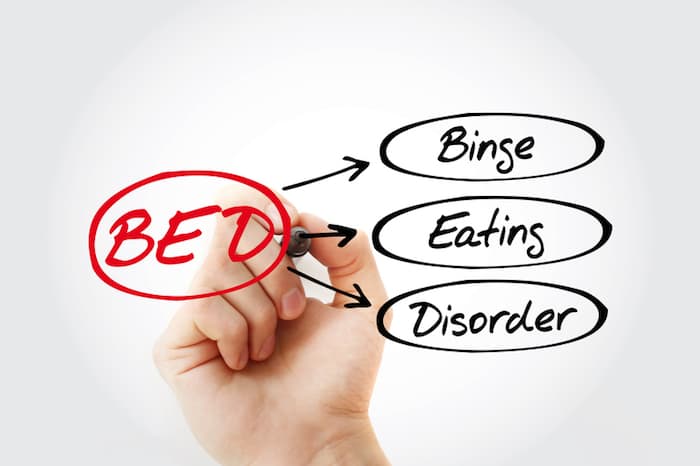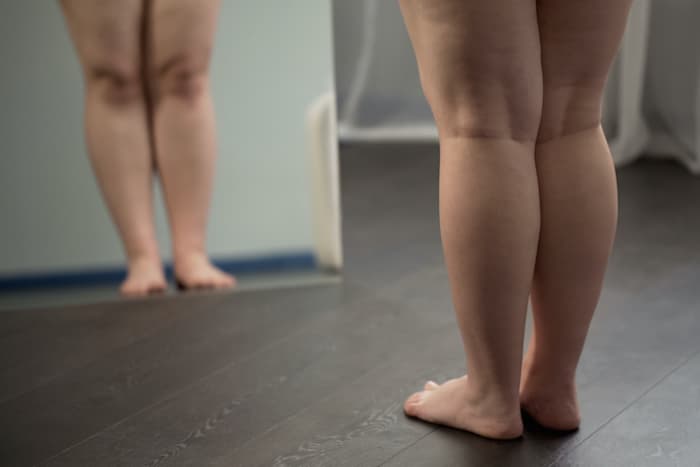- Calls to this hotline are currently being directed to Within Health or Eating Disorder Solutions
- Representatives are standing by 24/7 to help answer your questions
- All calls are confidential and HIPAA compliant
- There is no obligation or cost to call
- Eating Disorder Hope does not receive any commissions or fees dependent upon which provider you select
- Additional treatment providers are located on our directory or samhsa.gov
What is Binge Eating Disorder: Symptoms, Risks, & Causes
Binge Eating Disorder (BED) has been discussed as a disordered eating behavior since the 1950’s but was not officially recognized as its own diagnosis until the Diagnostic and Statistical Manual of Mental Disorders published its 5th Edition (DSM-5) in 2013. Even so, this is not an indicator of the severity or prevalence of BED throughout history. In fact, BED disorder is the most common eating disorder in the United States, therefore, awareness of signs, symptoms, and treatment interventions is important.
- Binge Eating Disorder Definition
- Binge Eating Disorder Statistics
- What Is Another Name for Binge Eating Disorder?
- Binge Eating Disorder Symptoms
- Anxiety, Depression, & Other Co-Occurring Disorders
- Binge Eating Disorder Health Risks
- What Causes Binge Eating?
- Binge Eating Disorder Treatment
- Webinar: Understanding the Facts About Binge Eating Disorder
Binge Eating Disorder Definition
An episode of binge eating is described as eating an atypically large amount of food in a short period of time while feeling of loss of control during the episode and immense shame and guilt afterward. Binge eating disorder may also be commonly referred to as Compulsive overeating disorder, or Night Eating Syndrome (NES), though the terms have slightly different criteria.
Binge Eating Disorder DSM-5 Criteria
The DSM-5 specifies diagnostic criteria that one must meet for a full diagnosis of a mental disorder. For BED, the following criteria are required for diagnosis:
- Recurrent episodes of binge eating, which are characterized by BOTH of the following
- “Eating, in a discrete period of time (e.g. within any 2-hour period), an amount of food that is definitely larger than what most people would eat in a similar period of time under similar circumstances.
- A sense of lack of control over eating during the episode (e.g. a feeling that one cannot stop eating or control what or how much one is eating).
- The binge-eating episodes are associated with three (or more) of the following:
- Eating much more rapidly than normal.
- Eating until feeling uncomfortably full.
- Eating large amounts of food when not feeling physically hungry.
- Eating alone because of feeling embarrassed by how much one is eating.
- Feeling disgusted with oneself, depressed, or very guilty afterward.
- Marked distress regarding binge eating is present.
- The binge eating occurs, on average, at least once a week for 3 months.
- The binge eating is not associated with the recurrent use of inappropriate compensatory behavior as in bulimia nervosa and does not occur exclusively during the course of bulimia nervosa or anorexia nervosa [1].”
ICD-10 Code for BED
The International Classification of Disease (ICD-10) codes allow professionals worldwide to identify or communicate a diagnosis regardless of differences in diagnostic terminology from culture to culture.
For BED, the ICD-10 code is F50.81.
Binge Eating Disorder Statistics
Binge eating disorder is frighteningly common in Westernized cultures, as many engage in binge eating behaviors but minimize these as “emotional eating” or falsely consider them as effective coping mechanisms. Below are some important factors about BED prevalence and impact provided by the NIH’s National Institute on Mental Health [2] [3]:
- 1.2% of adults in the US struggle with BED disorder.
- BED is two times more prevalent in females (1.6%) than males (0.8%).
- Research indicates that 62.6% of those with BED experience impairment in their daily lives and 18.5% experience severe impairment.
- 78.9% of those with BED experience a comorbid mental health diagnosis.
- BED often co-occurs with anxiety, mood, impulse control, and substance use disorders.
- 43.6% of individuals with BED seek treatment, with more women seeking out treatment than men.
- 1.6% of teenagers struggle with BED.
- BED impacts African Americans as often as white individuals, however, more research is needed on its impact among other racial and ethnic groups.
What Is Another Name for Binge Eating Disorder?
As mentioned above, there are numerous alternative understandings or terms for binge eating behaviors, however, it is important to know the difference between these terms and a BED disorder diagnosis.
Compulsive Overeating
Compulsive overeating is a term more commonly used to refer to Binge Eating Disorder. While the two are incredibly similar, there is one big difference – severity. Individuals with BED have met the diagnostic criteria specified above for a full diagnosis. Those that experience Compulsive Overeating may engage in bingeing behaviors of BED frequently, however, not enough to meet the full criteria for a BED diagnosis. Diagnostically, compulsive overeating would be referred to as OSFED, Other Specified Feeding and Eating Disorders. This does not mean the behaviors of excessive eating are any less concerning, however.
Night Eating Syndrome (NES)
Night Eating Syndrome (NES), involves “recurrent episodes of night eating, as manifested by eating after awakening from sleep or by excessive food consumption after the evening meal [1].” The DSM-5 also specifies that “there is awareness and recall of the eating” and that “the night eating is not better explained by external influences such as changes in the individual’s sleep-wake cycle or by local social norms [1].”
NES is specified in the DSM-5 under OSFED categories of disordered eating and differs from BED in that individuals with NES present with less shape/weight concerns as well as reduced disinhibition and depressive symptoms [4]. Additionally, individuals with NES tended to eat less during the day than those with BED [4].
Related Reading
Binge Eating Disorder Symptoms
With the prevalence of BED being so high and continuing to increase, it is important to have an awareness of signs and symptoms to support patients or loved ones should they begin to struggle.
Physical Signs of Binge Eating Disorder
BED can be difficult to identify, as the resultant shame and guilt of binge episodes lead to secrecy. If you observe some of the below symptoms in a loved one or patient, consider them to be red flags and do not be afraid to ask more questions.
- Eating unusually large amounts of food in a specific amount of time.
- Eating when one is not hungry or full.
- Eating at a fast pace.
- Eating alone or in secret.
- Hiding food.
- Eating until uncomfortably full.
- Reporting feelings of guilt or shame around eating.
- “Frequently dieting, possibly without weight loss [5].”
- Loss of sexual desire.
- Weight fluctuation.
- Reported feelings of low self-worth.
Anxiety, Depression, & Other Co-Occurring Disorders
78.9% of those with BED experience a co-occurring diagnosis, as BED behaviors can be a maladaptive coping skill or increase symptoms of other mental disorders such as depression or anxiety.
Anxiety Disorders: Many individuals that struggle with clinical anxiety present with disordered relationships to food. This could be a result of using food to cope with emotional dysregulation. It is also likely that the opposite is true and that the shame, guilt, secrecy, and feelings of loss of control that occur with binge eating result in increased anxiety symptoms.
Mood Disorders: Mood disorders, such as Major Depressive Disorder or Bipolar Disorder, are experienced by 46.4% of those with a BED diagnosis. This is unsurprising, as, similar to anxiety disorders, many individuals seek to cope with uncomfortable emotional states using food. This correlation may also occur due to an individual’s self-view and self-worth being impacted by their binge eating behaviors. Binge eating episodes can also lead to feelings of hopelessness or despair as one feels they cannot control their behaviors.
Other Co-Occurring Diagnosis: The relationship between BED and other diagnoses are similar to those with mood and anxiety disorders, with the disorders fueling one another. Some other disorders that commonly co-occur with BED include impulse control disorders and substance use disorders.
Binge Eating Disorder Health Risks
The impacts that consistent binge eating episodes can have on physical health long-term are concerning. Many may discount binge eating behaviors as “emotional eating,” however, if left untreated, they can be incredibly dangerous and lead to the following:
- Obesity
- High cholesterol
- High blood pressure
- Diabetes
- Cardiovascular issues
- Arthritis
- Gallbladder disease
- Increased risk of some types of cancer.
What Causes Binge Eating?
As with most mental disorders, there is not one specific cause of Binge Eating Disorder. There are many psychological, social, and biological factors that can contribute to BED development. For example, negative affect is commonly associated with BED, leading many researchers and professionals to believe that “binge-eating episodes are triggered by negative affect and provide relief from them [6].” Individuals that struggle with emotion regulation and emotional awareness also appear to have an increased likelihood of BED behaviors [6]. Interpersonal and social issues can also result in BED diagnoses. Further, research seems to clearly indicate a relationship between reward sensitivity as well as impulsivity, making one more susceptible to BED behaviors.
Binge Eating Disorder Treatment
Treatment for BED can be crucial in reducing the lifetime prevalence of the disorder, that is, reducing the likelihood one will struggle with BED behaviors for their lifetime.
As with most eating disorders, the number one, evidence-based treatment recommended is Cognitive Behavioral Therapy (CBT). One study notes that “CBT has higher abstinence, is well-tolerated, and maintains remission for 1 or 2 years [6]. CBT focuses on the impact that beliefs and thoughts have on subsequent feelings and behaviors, encouraging individuals to alter their core beliefs and thoughts in a way that then alters their behaviors.
Dialectical Behavior Therapy (DBT) is also recommended, as it was created for individuals that struggle with emotion regulation, which is also correlated with BED. DBT focuses on how one can regulate their emotional states, tolerate distress, exist within the present moment, and communicate needs to others. All of these skills work effectively to reduce BED symptoms as well as the symptoms of disorders that often co-occur with BED.
Regardless of the theoretical orientation to treatment, the key is to receive treatment at all. Of course, be a conscious consumer and do not be afraid to ask your treatment team if they are using the most up-to-date, evidence-based treatments and, if they are not, why they are not. Even so, the likelihood of individual achieving remission of BED symptoms and recovery increases with any type of mental health treatment.
Do not be afraid to seek out support, be an advocate in your treatment, and fight for a future free from BED.
Webinar: Understanding the Facts About Binge Eating Disorder
Presented by: Allan S Kaplan MD MSc FRCP(C) is currently a Senior Clinician/Scientist, Chief of Research at the Center for Addiction and Mental Health in Toronto, and Vice-Chair for Research and Professor in the Department of Psychiatry, University of Toronto. He is also Director of the Institute of Medical Science, School of Graduate Studies, Faculty of Medicine. He was the inaugural Loretta Anne Rogers Chair in Eating Disorders at Toronto General Hospital and is currently Senior Scientist, Toronto General Research Institute. He received his medical, psychiatric, and graduate school training at the University of Toronto. He has worked in the field of eating disorders for 30 years, has lectured widely on various topics in the field, published 150 peer-reviewed articles, two books, 50 book chapters, and over 200 abstracts. He is the Past President of both the Academy for Eating Disorders, the largest organization of eating disorder professionals in the world and the International Eating Disorder Research Society. He has been a continuously funded peer-reviewed investigator since 1992 and has received grant support from the National Institute of Mental Health in the USA and the Canadian Institutes of Health Research in Canada.
There are also three types of therapy that can be especially helpful in the treatment of BED. These therapies are:
- Cognitive-behavioral therapy (CBT): A type of therapy aimed at helping individuals understand the thoughts and feelings that influence their behaviors.
- Interpersonal psychotherapy (IPT): A form of therapy in which the focus is on an individual’s relationships with family members and peers and the way they see themselves
- Dialectical Behavior Therapy (DBT): A type of therapy that focuses on teaching individuals skills to cope with stress and regulate emotions
In addition to these methods, group therapy sessions led by a trained eating disorder therapist, as well as eating disorder support groups, may also be effective methods of establishing recovery from BED.
Resources
- [1] American Psychiatric Association. (2013). Diagnostic and statistical manual of mental disorders (5th ed.).
- [2] Unknown (2017). Eating Disorders. The National Institute of Mental Health. Retrieved from https://www.nimh.nih.gov/health/statistics/eating-disorders.
- [3] Unknown (2016). Definition and facts for binge eating disorder. National Institute of Health. Retrieved from https://www.niddk.nih.gov/health-information/weight-management/binge-eating-disorder/definition-facts.
- [4] Allison, K. C., Grilo, C. M., Masheb, R. M., & Stunkard, A. J. (2005). Binge eating disorder and night eating syndrome: a comparative study of disordered eating. Journal of Consulting and Clinical Psychology; 73(6), 1107–1115.
- [5] Unknown (2016). Eating disorders. The National Institute of Mental Health, Retrieved from https://www.nimh.nih.gov/health/topics/eating-disorders/.
- [6] Iqbal, A., Rehman, A. (2021). Binge eating disorder. StatPearls. Retrieved from https://www.ncbi.nlm.nih.gov/books/NBK551700/.
Author: Margot Rittenhouse, MS, LPC, NCC
Page Last Updated and Reviewed By: Jacquelyn Ekern, MS, LPC on August 16, 2019
Articles on Binge Eating Disorder
Am I Overeating or Do I Have a Binge Eating Disorder
Binge Eating Disorder is an eating disorder that masks itself as basic overeating. It can easily go undetected and it affects more men and women than Anorexia or Bulimia. But, do you have BED or are simply overeating like so many other people?
Renegotiating Binge Foods in BED Recovery
Many individuals who struggle with binge eating also may have particular foods that trigger binge episodes. Foods that are higher in carbohydrates and fats can cause the release of the hormone serotonin in the brain, which can induce pleasurable feelings. For this reason, people who are dealing with binge eating disorder often gravitate towards foods with these components, either for comfort or as a means of escaping from difficult situations.
Losing Your Job to a Binge Eating Disorder? It Can Happen
You spend about half of your life at your job. It is a big part of your social interaction and provides a platform to boost (or deflate) your self-esteem. So what does a binge eating disorder (BED) have to do with your job? Lots of people struggle with BEDs. Studies show as many as 2.6% of our adult population binge eat. Can it really put your job at risk? The answer is yes, and in more ways than you think.
Mindful Eating and BED
When it comes to eating, binge eating disorder may appear to be a food-related problem only. However, mindfulness teaches the practice or state of conscious awareness of oneself, the present moment, thoughts, feelings, and bodily sensations. Integrating mindfulness techniques in binge eating disorder treatment has been shown to reduce binge eating, improve nutritional outcomes, improve weight management, as well as enhance diabetes management.
Medical Nutrition Therapy for BED
Professional treatment for binge eating disorder will involve the collaboration of multiple professionals, including a therapist/counselor, medical doctor, psychiatrist, and registered dietitian. Each of these professionals works in their area of specialty to help address a concern that a person with binge eating disorder is facing.
Learning How to Eat Out in Binge Eating Disorder Recovery
Eating out at restaurants can also be a challenging experience for the person recovering from binge eating disorder. The combination of being in a restaurant environment coupled with the overwhelming food choices and portions can lead to a catastrophe.
Depression and Binge Eating Disorder
Depression is commonly associated with eating disorders, and it is often co-occurring with Binge Eating Disorder (BED). Trying to address Binge Eating Disorder can become more difficult if clinical depression is a key component or trigger for binge eating. This begs the question of “Did binge eating begin because of depression or did depression begin because of binge eating?”
The Black and White of Eating Disorders
The perception is that eating disorders normally affect Caucasian women, but eating disorders are color blind and will affect African American women as well. However, there needs to be more research conducted on African American women as most research is directed toward white women.
Binge Eating Disorder: When Comfort Eating Crosses the Line
Eating for comfort or emotional reasons is not necessarily a bad thing. That is as long as the food does not become the main source of comfort or method for dealing with life’s stress and challenges. Using food to consistently soothe emotional upheaval can quickly become Binge Eating Disorder, and this can result in some serious health consequences.
Using the Non-Diet Approach for Treating Binge Eating Disorder (BED)
While not as familiar as Anorexia or Bulimia, Binge Eating Disorder is a severe illness that requires equal attention and professional treatment in order to establish recovery. An important approach in addressing BED is the implementation of the˜Non-Diet’ method. This approach essentially teaches sufferers to respond to physical hunger as well as how to regulate feelings associated with food and eating. Use of this method along with other proven therapies can help in healing from BED. Read this article to learn more about the Non-Diet Approach for binge eating disorder.
Children Binge Eating: Different Stories but Similar Storylines
Binge eating is not only a concern for adults. Many children and adolescents have secret memories of having engaged in binge eating. These patterns are occurring ever more frequently in today’s image-focused, diet-obsessed world. Read two stories about young adolescents who engaged in binge eating disorder behavior.
Elevated Status for Binge Eating Disorder in the DSM-5
The diagnosis of Binge Eating Disorder has been added to the new DSM-V (Diagnostic and Statistics Manual) as it’s own separate diagnosis. This disease of BED, that troubles so many, is now more likely to be treated with the care and respect that binge eating disorder sufferers deserve. Learn about BED and the DSM-V in this article.
Binge Eating Disorder: How College Can Make It Worse
With anorexia having the highest mortality rate among any other psychiatric illness, the focus and attention given towards prevention and treatment is absolutely essential. However, sometimes overshadowed is the equally devastating Binge Eating Disorder, also classified as a major eating disorder by the American Psychiatric Association in May of 2013. Learn more about the devastating effects of BED while at college here.
BED research: What Do We Know?
Since Binge Eating Disorder (BED) was first mentioned in the second edition of the Diagnostic and Statistical Manual of Mental Disorders (DSM) in 1987, research on BED has come a long way in a relatively short period of time. In fact, in 2013, BED was added to the latest, fifth edition, of the DSM as its own diagnosis.
How to Avoid Falling into Using Food to Replace Tobacco
The evidence suggests that you don’t. You are likely to eat more when you first quit smoking, but that increased eating is healthy. It might feel like you are binge eating at first because you are eating more than you did when you smoked, but this isn’t necessarily binge eating.
Dispelling the Myths of BED
Given that overeating from time to time is normal behavior and binge eating is not, it can be hard to understand the difference. I hope to illustrate the differences and to dispel the myth that people with BED “just need more self-control” or “just does not care about themselves enough”.
BED & Co-morbid Health Concerns of Obesity
A very important development in BED is the fact that it is now listed as an official eating disorder diagnosis in the Diagnostic and Statistical Manual of Mental Disorders (DSM-5), which will increase awareness and help make it easier for patients to get treatment.
Binge-Eating Disorder and Compulsive Overeating: Are They the Same Thing?
When I work with someone struggling with compulsive overeating issues, not only will I be attentive to the details they express to me about the nature of these “binge” episodes, but also to the thoughts and feelings that may be at the root of this difficulty with food and emotions.
Breaking 5 Myths of Binge Eating
Binge Eating Disorder is the most common of all the eating disorders but incongruently, with the least treatment options for the sufferers. Until recently, BED was not even recognized as an actual disorder and could not be found in the Diagnostic and Statistical Manual (DSM) published by The American Psychiatric Association.
Correlation Between BED and Trauma
Studies have shown that patients who have experienced a trauma related event have been more likely to engage in self-destructive behavior. One form of self-harm is binge eating, which has been proven to be linked with traumatic events.
BED and Anxiety
Binge eating disorder (BED) and anxiety are deeply intertwined and often co-occur. In fact, approximately 37% of those who are diagnosed with BED are also diagnosed with a full-fledged anxiety disorder. Rather than a linear relationship model (i.e., that anxiety leads to binge eating behaviors or binge eating behaviors lead to anxiety), BED and anxiety are much more transactional and are comprised of biological, psychological, and social factors.
Binge Eating Disorder and the DSM-5: What the Changes Mean
Perhaps the most significant improvement with the DSM-5 is that Binge Eating Disorder (BED) has been moved from the obscurity of an appendix in the DSM-IV to being designated in the DSM-5 as a full-fledged diagnosis that parallels the other main eating disorders of Anorexia Nervosa (AN) and Bulimia Nervosa (BN).
BED, Holistic Health and Weight Loss
Overweight binge eaters represent a collision of two traditional treatment worlds: eating disorders and weight control. 30-40% of those seeking weight loss treatment meet the criteria for BED. In a residential weight control treatment setting, this link between overweight/obesity and binge eating is striking. Our mean BMI is 43.3 and data suggest that 43.7 % of our participants have BED. A host of co-morbidities results from this combination of eating pathology and obesity.
Interview with Carolyn Costin
Interview with Carolyn Costin: “I had been recovered from anorexia nervosa for a while and my friends knew this so when a young girl with anorexia needed help people sought me out. When I saw this person it was like I knew the inside of her mind. She felt understood and she got better. Then I got another referral and she got better too. Soon people all around my town and the surrounding cities started referring to me. It was only then, that I knew I had to do this work.”
Adolescent Depression and Binge Eating Often Go Hand-in-Hand
You feel depressed because you have eaten too much or you eat too much because you feel depressed. For binge eaters, this vicious cycle is relentless leaving feelings of guilt and shame in addition to other negative emotions commonly associated with depression.
Reasonable Exercise Plans for Someone Recovering from Binge Eating Disorder
For those struggling with binge eating disorder, their exercise patterns tend to mirror their eating patterns – falling prey to an all-or-nothing tendency. With food, this involves a restriction/binge cycle and for exercise, this all-or-nothing tendency usually shows up as a cycle of no pain/no gain exercise and then being sedentary.
BED and Mindfulness/DBT
A common approach that is often taught in recovery for binge eating disorder is the practice of mindfulness and Dialectical Behavior Therapy (DBT). While there may be some initial skepticism towards these psychotherapy methods, many individuals will find these practices helpful in dealing with urges to binge, which can occur at any point of their recovery from binge eating disorder.
BED: Celebrate Your Recovery by Committing to You
Living with BED can also become a way to survive and face life difficulties, and relearning healthy coping skills can feel as though you are unraveling your sense of reality.
BED & Bariatric Surgery or the Sleeve
Countless individuals struggle with Binge Eating Disorder throughout our nation though many suffer in silence due to the fears and stigmas that surround this painful disorder. A common physical effect that can result from BED is obesity, which can result from consuming a greater amount of food than is needed over time.
Kids Binge Eating and the Rise in Obesity in American Children
The response to this epidemic has sent many mixed messages to families, who may feel unsure about how to handle their growing children. Could a country that is hyper-focused on obesity in our youth, in combination with a culture that is saturated with a disillusioned media, be leading to a rise in eating disorders in younger generations?
Binge Eating Disorder and Family Patterns of Self-Soothing
The factors that influence the development of binge eating disorder (BED) are complex and involve genetics (your biological make-up), the environment of both your past and present, the social conditions you are exposed to, and much more. One aspect that that can also be influential in the development of BED is the nature of a family setting and the way in which children are taught to soothe themselves and cope with their emotions.
BED: Impulse Control and a Recovery Coach
Many individuals who suffer from BED would attest to the loss of control they often experience during bingeing episodes, feeling a sense of unconsciousness as they engage in food binges that take them beyond a normal point of satiety. Consideration of a BED recovery coach might be helpful!
Night Eating Syndrome: So Much More Than Just A Bedtime Snack
Night Eating Syndrome (NES) was first recognized in 1955 by American psychiatrist, Dr. Albert Stunkard. NES is an eating disorder in which the affected individual wakes several times in the middle of the night and is unable to fall back asleep without eating, even though he or she is not actually hungry. The food eaten is often unhealthy and calorie-dense.
Research on BED and Medication
Recent research has shown that binge eating disorder (BED) is quite common, affecting about 2% to 3.5% of the population.





